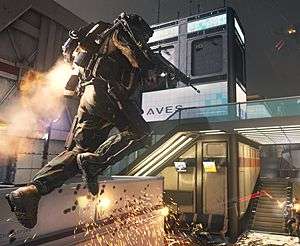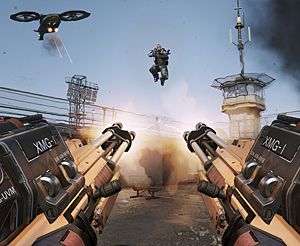Reporting For Duty
by Tim
 It’s that time of year again. The days are depressingly shorter, the nights brutally colder, and Christmas is just around the corner, which means Call Of Duty is about to drop like a tactical nuke. As sure as night turning to day, you can always count on Activision’s behemoth shooter cash cow to arrive in early November, without fail, every year and dominate the charts. Surer still is that every year the internet will slam the new game for recycling the same old ideas, for reusing the same old engine, for being the same old Call Of Duty. They’re valid complaints, of course, complaints even the biggest fans can appreciate. COD’s been resting on its laurels for years now, and despite a spate of record-breaking sales and generally strong receptions, you don’t have to look far to see fatigue setting in, with last year’s Call Of Duty: Ghosts failing to meet commercial and critical forecasts.
It’s that time of year again. The days are depressingly shorter, the nights brutally colder, and Christmas is just around the corner, which means Call Of Duty is about to drop like a tactical nuke. As sure as night turning to day, you can always count on Activision’s behemoth shooter cash cow to arrive in early November, without fail, every year and dominate the charts. Surer still is that every year the internet will slam the new game for recycling the same old ideas, for reusing the same old engine, for being the same old Call Of Duty. They’re valid complaints, of course, complaints even the biggest fans can appreciate. COD’s been resting on its laurels for years now, and despite a spate of record-breaking sales and generally strong receptions, you don’t have to look far to see fatigue setting in, with last year’s Call Of Duty: Ghosts failing to meet commercial and critical forecasts.
But for me, for this year, those complaints don’t apply. When I look at Call Of Duty: Advanced Warfare (or Call Of Duty 11, if you’re keeping count), it’s almost daring to defy expectation, not least because it’s brandishing a proper new engine. An inspired near-future setting, exo-suits granting almost super-human abilities, Kevin Spacey as an unhinged, power-mad Private Military Corporation leader – COD hasn’t looked this intriguing since 2010’s Cold War era-set Black Ops, or this can’t-wait-to-play exciting since 2009’s set-piece extravaganza Modern Warfare 2. For the first time in years, COD has shot to the top of my gaming Christmas list, beating the likes of Assassin’s Creed: Unity, Far Cry 4 and Halo: The Master Chief Collection. No, it’s not because I’m a fanboy, no, it’s not because of weak competition, and no, I’m not ashamed to say I’m looking forward to it, because Advanced Warfare genuinely looks like a great game, ticking all the right boxes and making all the right noises.
It wasn’t like that from the beginning, though. At first, I wasn’t sold on the idea of COD relocating to the future, something which had been heavily mooted for a long time. The series has disappointingly dabbled with near-future settings before of course, with Black Ops II’s second Cold War in 2025, and Ghosts’ pseudo post-apocalyptic America, but not to the extent seen in Advanced Warfare, which jumps even further forward in time and enters the realm of sci-fi with its exoskeletons, homing grenades and active camouflage. Luckily, it’s very much a grounded sci-fi, not going so far as to make things too silly, but far enough to provide that much needed shake-up. Crucially, the future setting isn’t there purely for window dressing, providing an equally well realised and researched vision of the year 2054, without which the exo-suits which lie at the crux of Advanced Warfare’s campaign and multiplayer wouldn’t be possible.
 The exo-suits in question look set to play as significant a role in gameplay as Kevin Spacey’s shifty Atlas CEO Jonathon Irons does in the story. Permitting super-strength, super-speed and super-agility, it means Advanced Warfare comes more in line with the likes of Crysis and Deus Ex than the CODs of yesteryear. Their addition, plus the upgrade system they’re tied to, should bring a level of flexibility to a series that has long been stuck in its age-old ways, opening up more options in battle than plain old running and gunning and stopping and popping. They also pave the way for some outlandishly over-the-top set-pieces. We’ve seen glimpses of a high-speed car chase involving the player character hopping from one moving vehicle to another à la The Matrix Reloaded, so who knows what other kinds of extravagant sequences will be in store for us.
The exo-suits in question look set to play as significant a role in gameplay as Kevin Spacey’s shifty Atlas CEO Jonathon Irons does in the story. Permitting super-strength, super-speed and super-agility, it means Advanced Warfare comes more in line with the likes of Crysis and Deus Ex than the CODs of yesteryear. Their addition, plus the upgrade system they’re tied to, should bring a level of flexibility to a series that has long been stuck in its age-old ways, opening up more options in battle than plain old running and gunning and stopping and popping. They also pave the way for some outlandishly over-the-top set-pieces. We’ve seen glimpses of a high-speed car chase involving the player character hopping from one moving vehicle to another à la The Matrix Reloaded, so who knows what other kinds of extravagant sequences will be in store for us.
Despite all this talk of change (I’m not quite prepared to use the word “innovation” just yet, though), at its core Advanced Warfare will still be about pushing forward through a string of successively explosive levels ripped straight from a Hollywood blockbuster, with the same polished and responsive shooting mechanics the franchise nailed years ago. That’s no bad thing – it’s what COD does almost better than anyone. But also, hopefully (and allegedly), Advanced Warfare will tell a memorable and intelligent story, one which carries emotional and political weight, concerning the real world rise of the private military sector and how wars might be waged in the future, speculating on the implications of new technologies in conflict, and showing us first-hand how the life of one Private Jack Mitchell (played by the always brilliant Troy Baker) is changed forever. And that is what excites me the most!
Yes, it’s easy to scoff at the idea of COD aspiring to spin a good yarn these days, especially since it was only last year we were told Ghosts would tell a “compelling” storyline with “relatable” characters. Can anyone actually recall what happened in Ghosts’ campaign, or remember any of the characters’ names other than pooch Riley? Despite roping in heavyweight writers like David S. Goyer and Stephen Gaghan, COD’s stories have failed to hit the mark in recent entries. Yet, games such as Spec Ops: The Line and, for its time, Call Of Duty 4: Modern Warfare prove it is possible to weave a subversive and cleverly constructed narrative arc in a traditionally gung-ho genre, and Advanced Warfare has the potential to be another standout exception to the rule. In lesser hands, Advanced Warfare’s exploration of the murky morals behind PMCs might come off as action movie fluff, but with Sledgehammer Games developing there’s a legitimate palpability that the story will live up to its premise.
 Sledgehammer Games, for those unaware, was founded in 2009 by Glen Schofield and Michael Condrey, the key creative duo behind the original (and best) Dead Space. Having brought some of the their Dead Space cohorts along with them, the team successfully pitched and set to work on a now-shelved third person action-adventure COD game set in Vietnam – referred to as Fog Of War – before being asked to assist in Modern Warfare 3’s development by their bosses at Activision, after the mass walkouts suffered by Infinity Ward in March 2010. It’s unclear how the development workload was split between the two studios but, judging by the relative disappointment of last years’ Infinity Ward-developed Ghosts, it’s a valid guess that it was Sledgehammer who saved Modern Warfare 3 from a similarly lukewarm fate.
Sledgehammer Games, for those unaware, was founded in 2009 by Glen Schofield and Michael Condrey, the key creative duo behind the original (and best) Dead Space. Having brought some of the their Dead Space cohorts along with them, the team successfully pitched and set to work on a now-shelved third person action-adventure COD game set in Vietnam – referred to as Fog Of War – before being asked to assist in Modern Warfare 3’s development by their bosses at Activision, after the mass walkouts suffered by Infinity Ward in March 2010. It’s unclear how the development workload was split between the two studios but, judging by the relative disappointment of last years’ Infinity Ward-developed Ghosts, it’s a valid guess that it was Sledgehammer who saved Modern Warfare 3 from a similarly lukewarm fate.
So, while the sci-fi edge and exoskeletons are undeniably a big draw, it’s really Sledgehammer and their eye-catching track-record, impressive storytelling clout and, most importantly, the fresh perspective they can bring to the table that ultimately makes 2014’s COD a more appealing and hype-worthy proposition than 2013’s. Not that the last few instalments have been anything less than good, contrary to what the internet says, but with the once almighty Infinity Ward now a shadow of their former selves, having lost a lot of talent to Titanfall studio Respawn Entertainment, and Treyarch still lacking finesse when it comes to pacing the action, framing the set-pieces and executing their ideas (kick the barrels, do we?), Sledgehammer are poised to become the COD development A-team come November 4th. With only a matter of days to go (December 25th for me), we don’t have to wait long to find out. Regardless of how cynical and jaded you’ve grown towards the franchise, it would be unwise to totally ignore COD this year.
Last five articles by Tim
- Future Perfect
- A Thief's Alternative End
- Uncharted 4: A Thief’s End - Review
- Ratchet & Clank - Review
- Gears Of War 4 – Multiplayer Beta Impressions





















There are no comments, yet.
Why don’t you be the first? Come on, you know you want to!